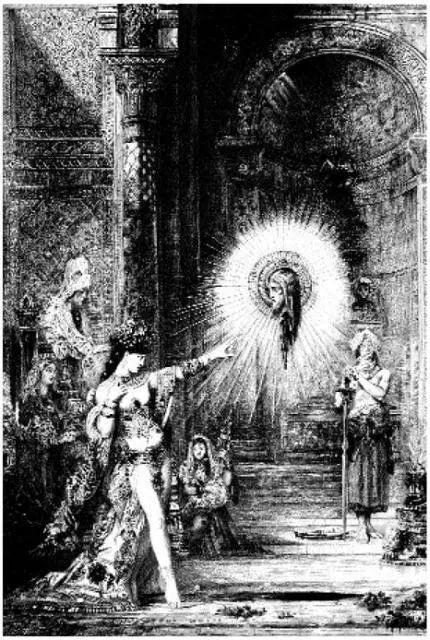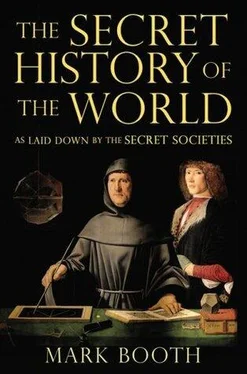Earlier in the century Frankenstein’s monster had been a fictionalized account of Paracelsus’s homunculus. Attending the same house party as Mary Shelley when she conceived of the monster, Byron’s friend Polidori wrote an early vampire story. But of course the most famous version is Bram Stoker’s, in which the preserved body in the tomb is a sort of demonic version of Christian Rosenkreuz. Stoker himself was a member of the OTO — the Ordo Templi Orientis, a secret society practising ceremonial magic. The Czech theosophist Gustav Meyrink would explore a similar theme in his novel The Golem, which in its turn influenced German expressionist cinema. It was said that in the novel Là-Bas, Huysmans spoke of what had really happened at black magic rituals from personal experience, breaking his oath of secrecy. Aleister Crowley noted with evident approval that he died of cancer of the tongue as result.
In art explicit occult themes can be seen in the symbolism of Gustave Moreau, Arnold Böcklin and Franz von Stuck, in Max Klinger’s waking dreams, in the weird erotic-occult art of Felicien Rops, whom a critic of the day dubbed ‘a sarcastic Satan’. Odilon Redon wrote of ‘surrendering himself to secret laws’.
THROUGHOUT THIS PERIOD THE SPIRIT of materialism was working for victory, devising materialistic versions of esoteric philosophy. We have already touched on the way that esoteric ideas of the evolution of the species appeared in materialistic form in Darwin’s theories. We have seen, too, how the ruthless and cynical manipulators of the Freemasons, the Illuminati, provided a methodology for revolutionaries in the late eighteenth and nineteenth centuries. Now Marx’s dialectical materialism translated the spiritual ideals of St Germain on to a purely economic plane.
Occultism also played a part in the development of Freud’s ideas. His mentor Charcot had in turn been taught by the prominent occultist and inventor of mesmerism Anton Mesmer. The young Freud studied the Cabala and wrote approvingly of telepathy, speculating that it might have been an archaic form of communication used by everyone before the invention of language.
He introduced into mainstream thought an idea that is essentially cabalistic — the idea of consciousness having a structure. For example, the model of the mind that Freud popularized — of super ego, ego and id — can be seen as a materialized version of the tripartite cabalistic model.
Indeed, at an even more basic level the very notion that there are impulses independent of our point of consciousness, but which may impinge upon it from outside, is a secularized, materialistic version of the esoteric account of consciousness. In Freud’s scheme of life these hidden forces should be interpreted as sexual rather than spiritual. Freud later reacted against the esoteric roots of his ideas and stigmatized as mad the ancient form of consciousness out of which they had grown.
The esoteric influences on Freud’s pupil Jung are even clearer. We have touched on how he interpreted alchemical processes as descriptions of psychological healing, and how he identified what he saw as the seven great archetypes of the collective unconscious with the symbolism of seven planetary gods.

Salome by Gustave Moreau.
By interpreting the alchemical processes as purely psychological he was denying a level of meaning intended by the alchemical writers — that these mental exercises can influence matter in a supernatural manner. And though Jung saw the seven archetypes as acting independently of the conscious mind, he would have stopped short of seeing them as disembodied centres of consciousness acting completely independently of the human mind. Indeed, when Jung met Rudolf Steiner he dismissed him as a schizophrenic.
But late in life, Jung’s work with the experimental physicist Wolfgang Pauli encouraged him to take a few steps beyond the pale. Jung and Pauli came to believe that in addition to the purely physical mechanism of atom knocking against atom there is another network of connections that binds together events not physically connected — non-physical, causal connections brought about by mind. Jung’s contemporary, the French anthropologist Henri Corbin, was researching the spiritual practices of the Sufis at this time. Corbin came to the conclusion that the Sufi adepts worked in concert and could communicate with one another in a realm of ‘objective imagination’. Jung coined the same phrase independently.
Later in life the materialistic explanations that Freud had been trying to force on to spiritual experiences also sprang back at him, and he became plagued by a sense of what he called the uncanny. Freud wrote his essay on The Uncanny when he was sixty-two. By thinking about what he feared most he was trying to stop it happening. A few years earlier he had experienced the number sixty-two coming at him insistently — a hat check ticket, a hotel room number, a train seat number. It had seemed to him that the cosmos was trying to tell him something. Perhaps he would die at the age of sixty-two?
In the same essay he described the experience of walking round a maze of streets in an old Italian town and finding himself in the red light district. He took what he thought would be the most direct route out of this district, but soon found himself back in the middle of it. This seemed to happen to him again and again, no matter which direction he took. The experience can only remind us of Francis Bacon. It was as if a maze were changing shape to keep the wanderer from finding the way. As a result of these experiences Freud began to suspect that there might be some complicity between his psyche and the cosmos. Or perhaps the cosmos was manufacturing meanings independently of any human agency and, as it were, beaming them at him?
If Freud had been forced to admit that either of these had been the case, even if in only one instance, then his whole materialistic world-view would have been smashed into pieces. Freud was naturally anxious to block these promptings. They left him in a disturbed state of mind.
THE EUROPEAN COLONIZATION OF OTHER parts of the world prompted a flow of esoteric ideas in the other direction, a reverse colonization of Europe. The British Empire in India led to the publication in English of esoteric Hindu texts, and as a result oriental esotericism is still better represented in bookshops in the West than its occidental counterpart. Similarly the French colonies in North Africa lent esotericism in French-speaking territories a strong Sufi colouring.
The partition of Poland in the nineteenth century caused the spread of that country’s alchemical traditions over the rest of Europe. A genuine Rosicrucian impulse survived in middle Europe in the form of Rudolf Steiner’s Anthroposophy. The Russian Revolution caused the occultists who had clustered at the court of the Tsars to flee, helping to introduce a stream of Orthodox esotericism in the West, and the Sufi- and Orthodox-influenced philosophy of Gurdjieff and Ouspensky became very influential in both Europe and America. In the 1950s China’s invasion of Tibet would cause the dispersal of Tibetan esotericism all over the world.
At a time when to many in the West the organized religion of the state risks being reduced to mere formalism, and seems to many to be sterile and exhausted, it would perhaps not be surprising if every intelligent person reaches a time in life when he or she wants to consider the great questions of life and death and whether or not life and the universe has meaning, and has to cast about for answers. Esoteric philosophy taken as a whole represents the richest, the deepest and the most fascinating body of thought on these questions.
Читать дальше













